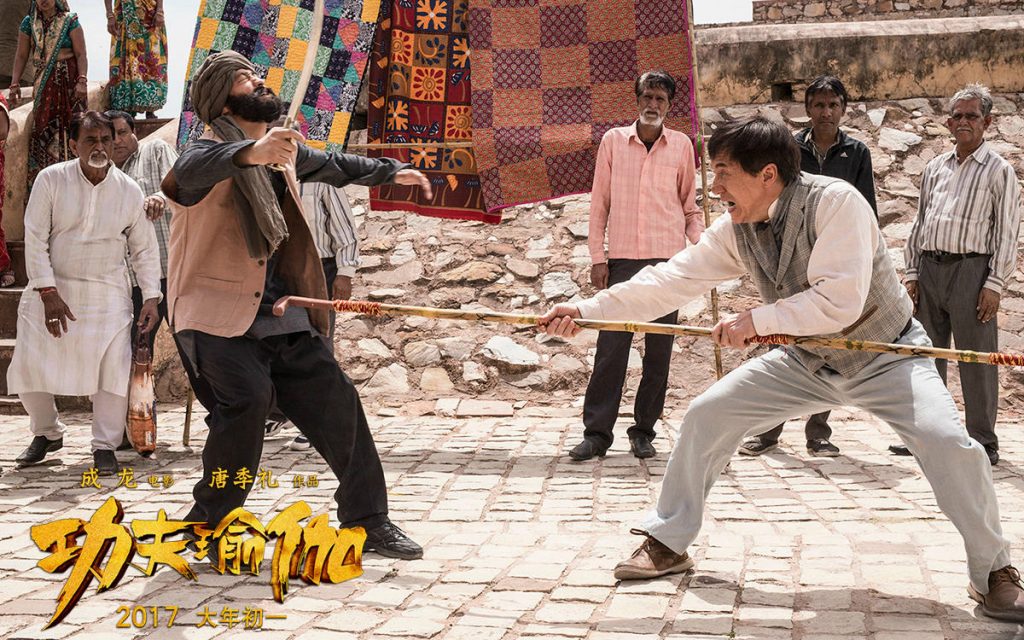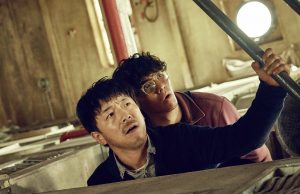Every day while CFI’s Hollywood readers take in the business of the Chinese film industry, the actual movies can sometimes seem exotic or remote. But in major US cities, mainstream Chinese films are increasingly available: thanks to Wanda’s purchase of AMC and distributors like China Lion, they get American theatrical releases practically simultaneous to their premieres at home. Though they receive virtually no publicity outside the non-Chinese community, these films are more than worth seeking out by anyone serious about engaging the Chinese industry, understanding the Chinese sensibility and familiarizing themselves with China’s talent pool. Periodically, CFI will review and point readers in the direction of noteworthy US releases of contemporary commercial and independent Chinese titles.

More ‘Kung Fu‘ Than ‘Yoga‘ in Jackie Chan’s Chinese New Year Gift
Kung Fu Yoga (2017), written and directed by Stanley Tong
Distributed by WellGo USA, opens in the US January 27, 2017 (cinemas here).
Grade: B
A scenic, fast-moving treasure hunt spanning China, Tibet, Dubai, and India, Jackie Chan’s latest action-comedy reunites him with one of his most simpatico collaborators, director Stanley Tong (Supercop, Rumble In The Bronx, First Strike, The Myth), for a result that’s easygoing and fun, a good-natured comedy that’s more Kung Fu than Yoga—if never quite fulfilling its potential as a true cross-cultural Chinese/Indian hybrid, it is nonetheless comfort food for CNY family viewing.
Tong’s return to the director’s chair (he’s made no films since 2005’s The Myth, although he was both a writer and producer on Chan’s CZ12, and has been active in Chinese television production) sets the stage for international adventure by mashing Chan’s old Armour of God films together with an even more explicit Indiana Jones homage: Chan plays an archaeology professor recruited by an Indian scholar to help locate missing treasure lost in a battle between Chinese and Indian armies in 647 A.D. When he finds a jewel that holds the key to said treasure, a motley crew with mixed motivations rushes in and in the ensuing scrum it is stolen and then reappears at auction in Dubai, from where the action moves to India, where in a final showdown all is revealed.
Chan has surrounded himself with an impossibly good-looking ensemble of young stars, including Aarif Rahman (Bruce Lee, My Brother; The Empress of China), and boyband EXO-idol Zhang Yixing (aka Lay), and gives each of them a turn in the spotlight—this includes a moment of WTF-level self-reference in a scene where Zhang arrives to save his colleagues from a pack of hungry hyenas, armed with a bucket of raw beef. “I can see they’re she-hyenas,” he yells. “I can distract them with my fresh tender meat!”
Meantime, the Hong Kong-born, Canadian citizen Rahman offers an impressive contrast in the masculinity department to the wispy Zhang: having lost the boyishness displayed in prior roles, he’s filled out into a ruggedly handsome, roguish actor with the vibe of a young John Cusack. Part of the scenario involves Chan’s mentoring Rahman in kung fu, and their enjoyable sparring and banter takes on another dimension with Rahman demonstrating sufficient star quality and skill to make it seem as if a torch may be getting passed.
However, it’s still Chan’s show, and as evidenced in exchanging kicks with Rahman, as well as fighting in an underground ice cave and an outdoor Indian market he demonstrates that at 62, he still has the strength and agility to dazzle and entertain at a virtuoso level, blending athleticism, dance aesthetics, and perfectly-timed comic filigree. Tong knows how to shoot him, using a wide-angle to keep his whole body in frame and giving the martial arts moves a sense of choreographic integrity and style.
The film’s centerpiece is a breakneck car chase through the streets of Dubai, where Chan and one of the Indian bad guys are pursued by police who drive Lamborghinis and Aston Martins, many of which get satisfyingly wrecked—the whole scene is given a stupid-funny twist when Chan discovers a lion in the back seat of the car he’s driving.
Chan and Tong wrap up the show with a full Bollywood production number that arises almost spontaneously. Everyone has learned that knowledge, not gold is the real treasure and the cast (eventually joined by the crew) breaks into song, with projections of India’s landmarks appearing behind the dancers.
That’s the good stuff. Unfortunately for Anglo audiences, when the Indian actors and the other Chinese cast besides Chan and Rahman speak English, one wishes there had been a more dedicated dialogue coach on-set. Much of the comedy is on the corny side, Tong sometimes likes to indulge excessively cutesy jokes, there is a bit of cringeworthy nationalistic dialogue, and while the CGI lion that terrifies Chan during the car chase sequence is first-rate, the film’s opening sequence, an extended flashback prologue set in the distant past and attempting to depict an ancient battle between Chinese and Indian armies is achieved with shoddy, videogame-level motion capture animation that sets precisely the wrong tone.
Kung Fu Yoga was originally announced as a Chinese-Indian coproduction, but Bollywood studio Viacom 18 dropped out of the production, which accounts for its China-heavy balance and perspective. But the Indian flavor, if superficial, still adds to the fun, and the film’s relentless geniality and real pleasures make it better than Skiptrace and Railroad Tigers, Chan’s other two films of this past year, and, while lacking the emotional depth between Chan and Jaden Smith in The Karate Kid, it’s still very nearly as good a time at the movies.
WHAT DOES THE GRADE MEAN?
Here are some recent & modern-era vintage Chinese and Hong Kong films for comparison
- A+
- PLATFORM (2000, dir Jia Zhangke)
- THE WORLD (2004, dir. Jia Zhangke)
- DRUNKEN MASTER 2 (1994, dir. Lau Kar Leung & Jackie Chan)
- KUNG FU HUSTLE (2004, dir. Stephen Chow)
- A
- LET THE BULLETS FLY (2010, dir Jiang Wen)
- THE MERMAID (2016, dir. Stephen Chow)
- A TOUCH OF SIN (2013, dir. Jia Zhangke)
- STILL LIFE (2006, dir. Jia Zhangke)
- MOUNTAINS MAY DEPART (2015, dir. Jia Zhangke)
- LITTLE BIG SOLDIER (2010, dir. Ding Sheng)
- EXTRAORDINARY MISSION (2017, dir. Alan Mak & Anthony Pun)
- MR SIX (2015, dir. Guan Hu)
- A WORLD WITHOUT THIEVES (2004, dir. Feng Xiaogang)
- SUZHOU RIVER (1999, dir. Lou Ye)
- HOUSE OF FLYING DAGGERS (2004, dir Zhang Yimou)
- RAISE THE RED LANTERN (1991, dir. Zhang Yimou)
- A-
- DUCKWEED (2017, dir. Han Han)
- I BELONGED TO YOU (2016, dir. Zhang Yibai)
- B+
- THE GREAT WALL (2016, dir. Zhang Yimou)
- OLD STONE (2016, dir. Johnny Ma)
- CRAZY STONE (2006, dir. Ning Hao)
- GO, LALA GO (2010, dir. Xu Jinglei)
- B
- KUNG FU YOGA (2017, dir. Stanley Tong)
- RAILROAD TIGERS (2016, dir. Ding Sheng)
- THE WASTED TIMES (2016, dir. Cheng Er)
- CHONGQING HOT POT (2016, dir. Yang Qing)
- MONSTER HUNT (2015, dir. Raman Hui)
- B-
- JOURNEY TO THE WEST: THE DEMONS STRIKE BACK (2017, dir. Tsui Hark)
- SOME LIKE IT HOT (2017, dir. Song Xiaofei & Dong Xu)
- BORN IN CHINA (2016, dir. Lu Chuan)
- D-
- TINY TIMES (2013, dir. Guo Jingming)





